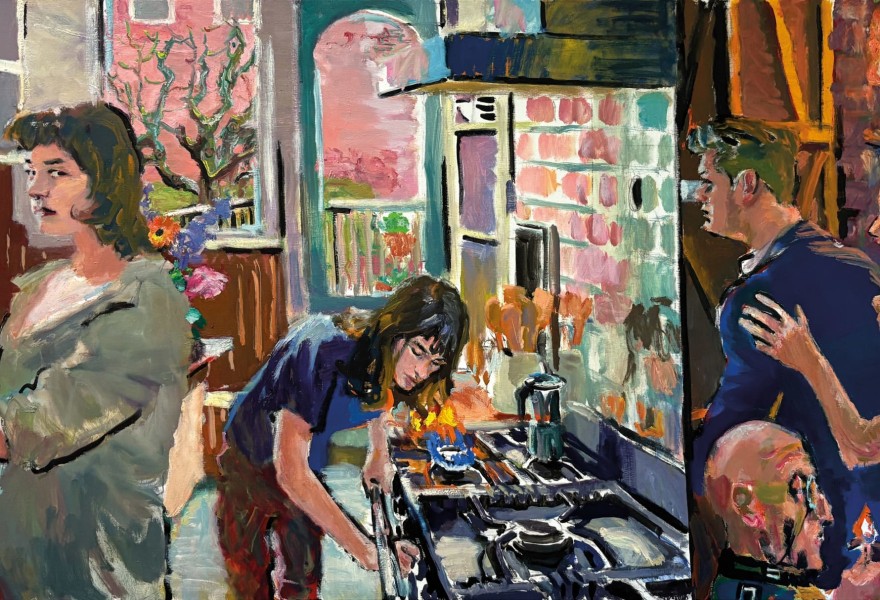08 may 2025, Flor Linckens
Sebastian Haquin and the shifting boundaries of reality
In the solo exhibition 'Hard Times', on view at Westerkadekunst in Rotterdam until 1 June, Sebastian Haquin presents a series of paintings in which the personal and the world around him converge. The London-born artist, who grew up in Australia and has lived in the Netherlands for over a decade, creates paintings rooted in everyday situations, memories and his imagination. In 2024, he received the Volkskrant Beeldende Kunst Publieksprijs (Volkskrant Visual Art Audience Award) at Stedelijk Museum Schiedam.
At first glance, Haquin’s portraits and still lifes seem ordinary and familiar: a figure in a room, a conversation on the move, a fleeting moment. A dream, or perhaps a memory. But on closer inspection, the logic of these scenes subtly begins to falter. In his work, the boundary between dream and reality becomes uncertain. Haquin often works with models to restage scenes from his imagination, finding concrete references for images that initially existed only in his mind. In doing so, fleeting thoughts take on a tangible form in paint.
Haquin's paintings are expressive, layered and marked by vivid use of colour. He paints alla prima, a technique in which wet paint is applied over wet layers without allowing them to dry in between. This imbues his canvases with a raw energy and vibrant texture. At the same time, the artist plays with our sense of focus and perspective. His compositions generally do not guide the viewer’s eye: foreground and background both demand attention, and the details compel a longer gaze.
The resulting works are charged with ambiguity and symbolism, enhanced by enigmatic titles such as "Prophecy" and "Oh mother, things ain’t going well". In one painting, two women shield their eyes from the light with their hands — it remains unclear whether they are looking at the viewer or searching for something just out of frame. In another, a man holds a Magneto mask. His reflection doubles his presence. The painting might raise questions about identity and forces that are large than himself. "Dreamer’s window" shows a lush garden filled with blooming wisteria, though it remains uncertain whether this is a real or imagined view. In "Wisdom is Earned", a woman in a black and pink heart-patterned dress stands in front of a vegetable stall, a laughing child beside her. The pink in her dress stands out, as the colour appears nowhere else in the composition. It makes her seem detached from her surroundings, as though she is more than a casual passer-by. Other motifs also carry a distinct charge: an urn, a Darth Vader helmet, a red flayed goat’s head. They seem to coexist without any clear hierarchy, as though meaning has no fixed position here. The visual language does not form a closed narrative but rather leaves space for individual interpretation. Haquin’s work reflects a sense of curiosity, a desire to understand without the need to immediately explain.
Charl Landvreugd, who nominated him last year for the Volkskrant Beeldende Kunstprijs, described his work as follows: "Poetically and with a light queer undertone, these paintings depict the underlying nervousness of people in their twenties and thirties." That sense of unease is also palpable in the exhibition 'Hard Times', in which beauty and melancholy walk hand in hand and nothing is entirely settled.



